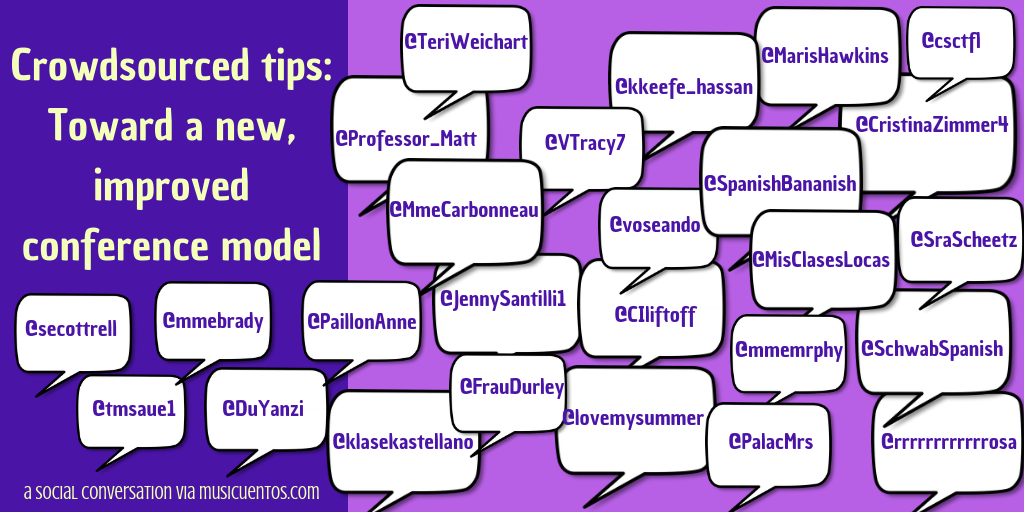I could be wrong, but it seems to me that teacher conferences are in trouble, and have been for a while. As I looked ahead to rejoining the conference scene, earlier this year I asked the language teacher community on Twitter to think with me about problems and solutions with conferences. I hope what we came up with is helpful as I try to distill and organize it in this post (which gives me a lot more empathy for those who have been involved in writing the #langchat summaries for years).
Before I launch into the problems and benefits related to conferences, let’s contemplate the question of blame for a minute.
Is it the hotels’ fault?

First, hotels that put on conventions and conferences most often do so for people in the private sector. Humana can afford to pay astronomical fees to send an employee to a conference. So can home health firms, security firms, marketing firms. Tattoo artists will pay it- it’s a business expense. Magicians will pay it – it’s a business expense. So the hotel has their own bottom line in mind, of course. Want to use the internet in your session? You’ll need to pay for that. The projector, too.
At the hotel where I will present for a conference this year, I actually have to pay for the screen. PAY FOR THE SCREEN. Dear ridiculous Hilton hotel, I can bring my own projector, but what am I supposed to do without a screen?
(Maybe a tech boycott wouldn’t be so bad, though. Cristina (@CristinaZimmer4) mentioned she’d “be interested to see a conference with no AV provided.” She claims @ToddWhitaker was the best presenter she’s seen at a conference and he presented with almost no technology.)
In this high-tech world, though, consider that at many downtown conference hotels, the wifi isn’t included in your room. And of course, you need to support their restaurant or room service, so neither is breakfast. You can get free wifi and coffee and pastries at a random Red Roof, but don’t expect any of that at the downtown Sheraton. (Just to give you some sticker shock, the average nightly rate at a Boston hotel is $254/night plus 14.5% in taxes at least. Dear ACTFL, let’s stay out of Boston, pretty please.)
Here’s another catch you may not know, unless you’ve stopped to ask why the organization keeps emailing you about staying at the conference hotel: if the organization does not actually book a certain number of rooms, they owe a fine so large someone recently referred to it as “compromising our organization.”
Let me put that another way:
Conference hotels are willing to threaten the existence of volunteer-based teacher organizations in order to maintain the same profit margin they expect from private-sector, for profit companies.
So, here’s my first brainstorming question.
What if a convention/conference hotel chain dared to offer significant concessions to educational conferences because of who we are? Because we’re training the future marketing firm professionals who will pay all their exorbitant costs?
Is it the district’s fault?

Let me soapbox just a little more, this time on the institution side.
When I first moved to my city and started teaching, the private school had an incredibly supportive administration. They gave every teacher PD time, even if it was to sit at home and read a professional book (because when do we have time for that?). Not only did I have no trouble getting conference days off, as long as I wasn’t requesting a ton of them (maybe 2-3 a year), they funded my way to my first state conference here. The head of school looked at me like he’d never been asked. “Sounds like a really good idea,” he said. And it was. I was still a newbie, only my third year teaching, and joining my state organization quite drastically changed me as a teacher and a person. That’s where I discovered storytelling, for one thing.
Fast forward a few years and you know the story: new leadership, new policies. The changes were regular and significant. My little world language department was eliminated and brought under the umbrella of Humanities (which also eliminated my department head stipend). Leadership lamented the lack of a Scantron machine in the school and got annoyed that I didn’t know where the textbooks (we weren’t using) were. And all thought of conference funding was gone.
Dear district and school leadership,
what message is it to tell your teachers you want them to know and implement all the latest improvements but by the way, pay for all that yourself? And shockingly often, pay for your own substitute?
Here’s my next brainstorming question.
What if principals and district leadership put as much effort into quality professional experiences and connections for their teachers as they do into learning management software and busing schedules?
Or, to bring it to a question that hits me almost every time I drive under the overpass to leave my neighborhood:
What if state government put as much funding into supporting teacher PD as they did into the crazy expensive sound barriers that protect my privileged little ears from the highway traffic?
Okay, let me get off those soapboxes and get back to our group conversation.

More of this at conferences, please
Several months ago, I asked a couple of questions on Twitter. The first was to try to identify what it was that teachers love so much about going to a conference. If we can identify common threads in what we love, then let’s replicate that, right? Let me try to synthesize and organize the insights I got.
Technology: Show, don’t tell
One of my favorite sessions to attend at conferences is a hands-on tech demo. I just can’t keep up with all the changing technology or how it might work in my classroom. I don’t have time to test them all. But everyone has time to test and present one thing. Also, as soon as a tool throws me a curve ball, I give up on it. A tech demo session forces me to watch how it works and contemplate its use in my classroom. Kristine (@kkeefe_hassan) agrees with me that this type of session should be “something fairly interactive, rather than just being talked at.”
Sessions in the TL
A few years ago, I gave my first all-TL session, on storytelling, at the Texas association’s conference. It was fun and it was hard. The next year, my own state organization encouraged target-language submissions (and got some push-back on this). I complied with a session on using commercials, and it was very well-attended and well-received. (Interestingly, I was on the proposal review committee for this year’s conference and I don’t recall seeing any to be given in the TL, though there could have been a few.) For this post, I wanted to know what other teachers and leaders thought about the question.

As it turns out, this issue can be a can of worms, and everyone seems a bit divided on it. Kelly (@SraScheetz) finds a target-language extra is enjoyable; it’s “an occasional chance to be immersed in my language – like a pre-conference workshop option.” But what about main conference sessions actually given in the target language? Kelly has some skin in the game here, as she’s in full-on conference organization mode for the Tennessee association, TFLTA. This year, they requested that presenters who submitted a session focused on a specific language to present in that language. However, she added that a world language conference “should not be organized around TLs.” If teachers want a target-language conference, their national organization like AATSP can provide something closer to that goal, but at the state and regional level, as Kelly said, “we don’t all have that.”
When I asked the PLN for more comments on this type of session, @mmemrphy commented that “sessions in the TL are so important.” Rose (@rrrrrrrrrrrrosa) added that her conference (New York) “always includes TL workshops; attendees look forward to them. It is difficult to recruit presenters who can speak to the K-16+ community, but it’s absolutely worth it.” A little south of there, Jenny (@JennySantilli1) said that in West Virginia, “most sessions are in English. But, presenters can choose to do one in TL. Some present in English but have examples in multiple languages. Our organization mtgs (AATSP, etc) are always in TL.” Matt (@Professor_Matt) focused on the benefits for native speakers of the TL attending conferences: “In my opinion many of our WL colleagues can feel left out of or discouraged by English only conferences, especially because many of them process, apply and re-negotiate meaning of our best practice concepts in their L1 (alone, with colleagues, etc.).”
On the other hand, teachers know there are drawbacks to having TL sessions. Maris (@Marishawkins) identified this would be tough for teachers who don’t teach the “big-audience” languages, Spanish and French in particular: “Teachers are always asking to improve their TL if they aren’t native speakers, but for lesser taught languages- it would really limit what those teachers could attend.” One of those teachers, @FrauDurley, chimed in with that very opinion: “I get sad because so few are in German and the other languages seem to have so much more applicable to me.” She did add that she could “see how beneficial it could be, though.”
Viviana (@VTracy7), a Spanish teacher, and Thomas (@tmsaue1), whose background is in teaching German, also weighed in on both sides. Thomas acknowledged that, depending on the conference’s purpose, there is “incredible value in TL sessions, TL conferences, or more importantly TL experiences.” Viviana does think it is “fun to share a common TL” but she feels “so torn on this.” However, she was concerned about the teachers giving and receiving such sessions: “Maybe not all teachers have the same (presentational and interpretive) proficiency and might feel uncomfortable.”
Indeed, in my Texas session, a particularly pedantic attendee sat on the second row and corrected me several times (“Lo siento, soy editor“) before a supportive (also native-speaking) woman behind him raised her hand and said, glaring at him, something along the lines of “This isn’t relevant to the topic, but I just have to say how bold it is for you to do this in your second language and how completely beautiful your Spanish is. Where did you learn it?!” But I hadn’t thought about whether teachers below my proficiency would struggle to follow along.
Here’s another point that Viviana and Thomas made in different ways: if what we’re doing is essentially the same process, we should be talking about it together, in what Thomas calls “a common language to discuss pedagogy.” Viviana said it this way, “I’ve learned so much from teachers of languages other than Spanish. [Isn’t] good world language teaching not TL specific?” Thomas added, “Any organization that invites speakers of multiple languages is hoping to help all, and I think it’s a good sign when an organization moves towards not tagging/inviting language-specific sessions. We can learn so much from other language teachers.”
In the end, Diane (@DuYanzi) echoes the majority opinion: offer a mix of TL-sessions and English sessions. She says that if the sessions are given in the target language, they help with context-specific strategies and content, as well as helping nonnative teachers improve their “professional-level L2.” The English-language sessions offer a balance of perspectives from teachers and researchers of other languages.
A broad scope of sessions

Rounding out my top-three picks of conference pluses was a broad scope of sessions related to where you are as a teacher. I love to see sessions for the beginner figuring out what it means to go from developing a ten-page minute-by-minute standards-aligned lesson plan for your methods prof to putting together 3 (or 6!) lesson plans for every single day. I love to see sessions for the harried teacher who feels textbookless teaching and standards-based grading has replaced the hobbies she kinda remembers having a while back. I love to see sessions for the seasoned teacher who’s there for some serious re-energizing; he feels like he’s doing the same thing every day waiting for June (or retirement) to get here.
Maris (@marishawkins) mentioned a different type of variety: the kind of takeaway a session gives you. She wrote, “I love coming away with a variety of ideas – something to incorporate instantly as well as something to think about for the future.” Anna (@PaillonAnne) agreed: “A broad scope of topics, for sure! I like to be able to expand my knowledge in multiple directions on the same day!”
An unconference segment
I was going to say an unconference session is unstructured, but that’s not really true. An unconference, or an unconference session at a conference, is simply untraditionally structured. The specific topic(s) are not determined ahead of time. The overall theme (assessment, target language use, resources, technology, etc.) might be suggested, but the specific topics are determined by the participants when they get there. I’m not going to spend too much time here because I’m working on a post of more crowdsourced tips specifically on unconferences and unconference-type sessions, but I will say that many participants (including me) enjoy the opportunity to schedule a chat on… anything related to the field, especially on something underrepresented in the conference sessions. Maris (@Marishawkins) has a lot of experience with this kind of session, and she says she enjoys “having an unconference type event so I can actually TALK to people instead of just listen. And because unless I know you know me, I am WAY too shy to actually get a [conversation] going.” Kristine (@kkeefe_hassan) agreed; she’s a big fan of the #edcamp model.
Networking in general
The more networking opportunities you can generate, the better. At our state conference, we traditionally have a wine and cheese reception on Friday evening, followed by immersion dinners sponsored by the AAT organizations. This year, we’ve moved the immersion dinners to Thursday for early arrivals, and Friday night we’re going to try out a trivia night. There have been years we invited presenters for salsa lessons, and years there were international festivals nearby that we encouraged teachers to attend in groups. Make it fun! Here is what we’re looking for:
- “The chance to talk with other teachers (and to meet [ones] who have inspired me via their blog, etc.)” (kkeefe_hassan)
- “Pizza with my peeps!” (@lovemysummer)
- “Making connections.” (@mmebrady)
- “The summer camp feeling of being with a group of people who all care about the same things I do!” (@CIliftoff)
- “Structured time to get to know colleagues.” (@mmemrphy)
Less of this at conferences, please
And then I asked the flip side of that question: What should we change about conferences? What’s not going right? The biggest issue was clearly the fee structure.
Presenters paying… more than the attendees?
As I mentioned above, this is mostly the hotel’s fault, but at some conference, the presenters pay the regular fee and then have to pay if they want tech support. ($50 for a projector for an hour? I paid about $230 to own mine.) Which ends up meaning that the presenters pay more than the attendees- and, of course, end up working harder and getting to attend fewer sessions than regular participants. I gotta tell you, people are pretty fired up about this.

The general consensus was that presenters don’t care what it takes; the fee structure for presenters needs to change. Sebastian (@voseando) wrote, “I think it’s unfair that presenters ‘make’ the conference, but still are being charged to present, and at usually the same rate as attendees!” A. C. Quintero (@klasekastellano) agreed that it was preposterous to charge presenters the full conference fee: “Sessions attract people and I think presenters should get a discount, at least 10%.” She actually called ACTFL because she was sure the full-price registration had to be some kind of mistake. “You take months preparing, sometimes you pay your own way to the conference, and then pay full fee? Que va! Ni loca! No incentive whatsoever.”
For many people, this is a hill to die on. @SchwabSpanish has actually quit the pay-to-present model: “Teachers need to stop treating everything like a charity. In other professions you get stipends for presenting. Paying to present is unheard of. I’m okay with Edcamp and free conferences, but no more paying to present for me.” (And, in fact, an education conference I presented at actually paid me a stipend, as a regular session presenter.) @SpanishBananish wanted me to know she wasn’t at ACTFL last year because “it’s way too expensive. I would love to see a more affordable event that prioritized affordability/access. Networking and idea sharing (via planned sessions and, ideally, ‘unconference’ times as well) are so much more valuable than keynotes, etc.” Let me tell you, those keynotes are a huge expense for the organization, particularly ACTFL. I’m serious. It’s almost half my annual household income. Indeed, this year my state organization eliminated the keynote in favor of a general session with guest Teachers of the Year discussing the state of the profession.
The official Twitter account for Central States, @csctfl, (managed by Sarah, I believe) joined the tense conversation on conference fees. She told us, “We do try to keep our [registration] fees relatively low (compare with ACTFL fees, for example) and we also absorb all but a tiny fraction of our AV costs.” The Central States registration did cost me $10 less this year than my state organization registration, including the screen fee for Central States, but my state conference fee includes the awards luncheon and other snacky perks (cough, no spa fee). Sarah protested from the point of view of someone who’s been behind the scenes for conference organization a lot: “This is our financial reality in doing our best to put on a good conference reasonable enough in price for many to attend.”
That’s not enough for Allison (@MisClasesLocas): “It should NOT be the presenters paying the extra AV fee! That cost should be split among attendees. Charging more for those actually presenting is insane.” @PalacMrs weighed in: “And they wouldn’t have a conference without presenters… lower fee, free year of membership, meals. Something should be offered.”
Again, let’s hit back at the hotels over this. Maris (@Marishawkins) and I are on the same page. Either the conference hotel realizes we’re nonprofit educators or “perhaps conferences can look at different places instead of hotels/conference centers.” Maris wondered, though, “Are they all too small?”
What can be done? For one thing, the Kentucky organization purchased their own set of projectors and crowdsourced the rest in order to place a projector in every room without additional fees. Also, ask Stephanie (@MmeCarbonneau). She will tell you that her state conference is free if you present. (Count us in, Maine.) So, state conference people, contact the Maine organization and see what they do.
I’d argue that for presenters, there is an incentive in sharing what you know and networking, but I get the point.
Super weird/inconvenient scheduling of sessions
No one else joined me in this protest, so this paragraph will be short. One thing that bothers me about conference scheduling is when similar sessions are scheduled at the same time. Don’t get me started on the time a conference scheduled me and Helena Curtain at the same time doing the exact same topic of increasing TL use and refused to let us combine our sessions. And did I mention that it was the last session slot on the last day.
My other scheduling peeve is when 3-hour workshops are scheduled across session slots. As in, if you choose a workshop you’re missing perhaps 2 entire session sets.
Lack of reflection
For some, the fee structure wasn’t even the main detractor that plagues conferences. Thomas (@tmsaue1) urged us,”It’s time to rethink the model.” Specifically, he wanted to know, “What evidence have conferences collected that their sessions are effective and prepare teachers to transform their classes?” Diane (@DuYanzi) agreed that “what happens after conferences may be what matters most. How does [professional] development get implemented back in class? How do teachers make changes that last, based on principles of [Second Language Acquisition] and student and teacher needs? How do we maintain that sense of support we love at conferences?” Teri (@TeriWiechart) suggested that the answer was in your group back home (or online): “Local collaboration and support groups or online PLCs help continue what starts at conferences. The weeklong conferences are great for introduction to ideas, connections to trainers and inspiration.”
This is an intriguing idea for me and it’s the narrow question I’ll leave you with here: how can conferences evaluate their effectiveness and keep the learning going past the hotel cleanup?
If you made it this far… the big questions
Now let me ask a couple of broader questions:
What big or small change have you seen at a conference that had a big impact, positive or negative?
What will you do to effect positive change at the next conference you attend?
If you didn’t catch this conversation on Twitter in time to join, please do so in the comments!
 If Musicuentos has significantly helped you in your language teaching journey, consider becoming part of the “thanks” crew on Patreon. Amigo-level patrons receive all material developed for conferences, and “La lotería” patrons receive every resource I produce, whether it’s a $2 activity or a $50 ebook guide, as thanks for their sponsorship.
If Musicuentos has significantly helped you in your language teaching journey, consider becoming part of the “thanks” crew on Patreon. Amigo-level patrons receive all material developed for conferences, and “La lotería” patrons receive every resource I produce, whether it’s a $2 activity or a $50 ebook guide, as thanks for their sponsorship.
7 Comments
Comments are closed.




I have @PaillonAnne as Anna and that Twitter handle doesn’t exist! Props to anyone who can help me figure out how to correct my misnoting of her handle / name.
From a Musicuentos reader:
Our state conferences were held at a hotel/conference center in our state capital. Our rooms were about $100-120 per room per night. If we booked the room block, we got some perks. However, we are paying $240 for a room in New Orleans, plus taxes. On a retired teacher’s income, that’s too much.
I also agree that presenters should get a discount in their registration fee. We aren’t there yet, but we are a small organization. Our numbers are declining because teachers can’t get the time off, there are no subs, teachers have to pay for the subs plus other expenses…you know how the story goes. We do have a small amount of grants for student teachers, new teachers and experienced teachers. We also provide a data projector and screen in all session rooms at no charge to the presenters. We had to raise the registration rates a little, but if 500 people pay $5 extra, that helps. It also attracts more presenters, especially the young teachers who have tons of new ideas, especially in technology.
As far as session conflicts, scheduling is a problem in every conference. There’s too much to go to and you have to make choices. ACTFL workshops are ridiculously expensive too (our workshops are $50 if that, and we give an honorarium to workshop presenters). This includes workshops vs sessions. If you are at a workshop, you can get state CEUs. Our conference is relatively small (2 days) and we have limited time. At ACTFL, Thursday is workshop day and the sessions are Friday, Saturday and Sunday.
Target language sessions…oh boy, I’ve heard it all. Even if you identify them in the program (in bold, capital letters, etc.) someone who teaches German will go to a Spanish TL session and complain, “I didn’t know it was presented in Spanish”. We also tried a TL luncheon and eventually phased it out because of low turnout.
[…] development and conferences, I hope that many big conferences can take Sara-Elizabeth’s crowdsourced tips into […]
At MCTLC this upcoming year, we are doing topic tracks, where like-topic sessions are scheduled in conservative, not over-lapping times. We have 4 topic tracks this year – TPRS/CI, teaching heritage learners, assessment, & proficiency. So attendees interested in these topics can attend a whole day off these sessions, one right after another. We hope it’s a creative solution to the scheduling issue!
Whoa – I may have to ask you more about this!
[…] so, as I did when I was contemplating how conferences in general might be improved (see that post here, heads up IT’S LONG), I reached out to the Twitter teacher community to crowd-source some […]
[…] and prolific Sarah Breckley. There’s so much free online help out there, dare I say the conference model is on its way […]